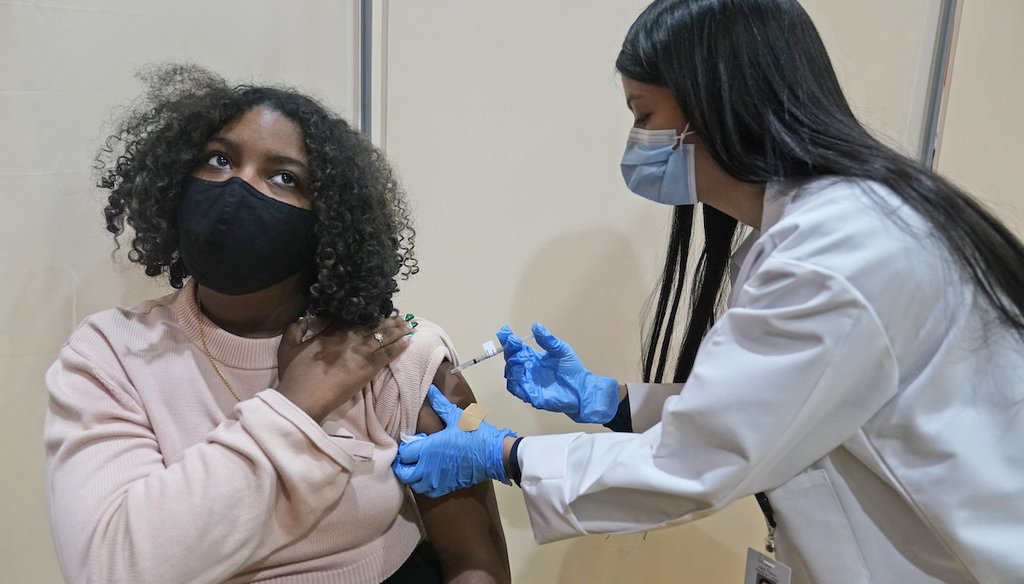Stand up for the facts!
Our only agenda is to publish the truth so you can be an informed participant in democracy.
We need your help.
I would like to contribute

A vaccine recipient receives her first dose of the Pfizer COVID-19 vaccine in West New York, N.J. (AP)
If Your Time is short
-
A Feb. 16 study in the Lancet medical journal found that, for people who had COVID-19 immunity resulting from infection, protection from severe disease and death remained high for at least 10 months. However, people could be reinfected, particularly with an omicron subvariant.
-
The protection from infection is “equal to if not greater than” the protection received from two doses of an mRNA vaccine, the study authors said. But they cautioned that vaccination remains the safest route to immunity..
-
Experts acknowledged mistakes about how infection-induced immunity has been handled. They said health officials emphasized vaccine immunity early partly because of the dangers associated with infection and the difficulty of verifying natural immunity.
-
The Lancet study researchers, and other experts who reviewed the data, said public officials should factor infection-induced immunity into policy decisions, including vaccine mandates.
New research suggests that COVID-19 immunity acquired from infection is as protective against severe illness and death as immunity acquired through vaccines.
Many social media users have interpreted the findings, published Feb. 16 in the Lancet medical journal, to mean that some health officials "lied" when they said vaccine-induced immunity was stronger. Others suggested that the study proves that infection-induced immunity is the preferred route to immunity.
But medical experts, including the Lancet study’s authors, continue to stress that vaccination is the safest path to immunity. They say developing immunity via infection must be weighed against the risks of severe illness and death — not to mention serious lingering health issues — that could come from a COVID-19 infection.
Although some people have claimed that the risks from COVID-19 aren’t that high for younger, healthy people, experts say that’s not true. The virus can behave erratically, and has made many young people seriously ill or killed them, while older folks were always at high risk.
"The problem of saying, 'I'm gonna get infected to get immunity' is you might be one of those people that end up in the hospital or die," said senior study author Dr. Christopher Murray, director of the Institute for Health Metrics and Evaluation at the University of Washington.
"Why would you take the risk when you can get immunity through vaccination quite safely?"
Researchers involved in the study, and experts who weren’t, also said the findings should spur officials to consider protection from past infection alongside vaccination when providing guidance on public policy decisions such as vaccine requirements.
The authors wrote that immunity from infection should be considered when "providing guidance on when individuals should be vaccinated, and designing policies that mandate vaccination for workers or restrict access, on the basis of immune status, to settings where the risk of transmission is high, such as travel and high-occupancy indoor settings."
The study, funded partly by the Bill & Melinda Gates Foundation and conducted by University of Washington researchers, is considered the largest review to date of available data on immunity following infection.
The meta-analysis (which combines the results of multiple scientific studies) included 65 studies from 19 countries published through September 2022. It compared the risks of COVID-19 in people recovered from past infections, with the risks to people who hadn’t been infected. People with hybrid immunity, which is immunity from both infection and vaccination, were not included. The research also didn’t include omicron subvariants that were dominant in late fall and early winter 2022 or the current subvariant, XBB.1.5.
The study found that, on average, prior infection was about 88% protective against hospitalization and death for at least 10 months after infection.
Overall, the analysis suggests that protection from past infection "is at least equivalent if not greater than that provided by two-dose mRNA vaccines," the researchers wrote.
Protection against reinfection declined over time but remained high for pre-omicron variants at 78.6% at the 10-month mark, according to the study. With omicron, that protection dropped to 36%. This is consistent with evidence that protection against symptoms diminishes faster than protection against severe outcomes.
Immunity acquired from infection also appeared to last longer than vaccine-induced immunity.
Nevertheless, experts emphasized that vaccination is still the safest route to immunity.
"Vaccination offers a way to get immunity without having to suffer the consequences of COVID-19, which can be particularly bad if you had no immunity prior to the infection," said Deepta Bhattacharya, a University of Arizona professor of immunobiology. "Even if vaccination conferred subtly less or shorter immunity than an infection, comparing the two seems beside the point. I’m sure recovering from polio would leave you immune too, but why would you take the chance?"
There’s also the risk of having symptoms that persist over time, known as long COVID. Research has found that having a more severe COVID infection means a higher chance of developing long-term medical problems that can last weeks, months or years.
A recent study in Nature identified more than 200 long COVID symptoms that range in severity and affect multiple organ systems. At least 65 million people around the world are estimated to have long COVID, with cases increasing daily, the authors noted.
COVID-19 infections are also causing a sharp increase in autoimmune diseases such as lupus and rheumatoid arthritis, as well as debilitating illnesses such as POTS, which stands for postural orthostatic tachycardia syndrome. POTS, an autonomic nervous system disorder, can cause fainting, irregular heartbeats and dizziness and appears to affect young women the most; there is no known cure.
Medical experts we talked to said the Lancet analysis’ results were unsurprising as it was a review of already-reported findings.
"We’ve known for a very long time that SARS-CoV-2 infection generates robust immunity including protection from disease. That is not new. This is a fairly well-done meta analysis that puts more concrete numbers to this effect, but scientifically it is not new or surprising," said John Wherry, director of the institute for immunology at the University of Pennsylvania.
One of the most promising findings on COVID-19 immunity is the effectiveness of hybrid immunity, which experts say provides the highest level of protection.
Some of the strongest research came in January 2023, when a World Health Organization study found that, in fully vaccinated people, the mix of protection from infection and vaccination was more than 97% effective at preventing hospitalization and severe disease a year after the most recent infection or vaccine shot.
"Individuals with hybrid immunity had the highest magnitude and durability of protection, and as a result might be able to extend the period before booster vaccinations are needed compared to individuals who have never been infected," the analysis said.
The Centers for Disease Control and Prevention still recommends COVID-19 vaccines for people ages 6 months and older, even if they have been infected before.
PolitiFact reached out to the CDC about the research and asked whether it would change the agency’s vaccination guidance.
In an email, a spokesperson confirmed that the agency continues to recommend vaccination and said multiple studies have shown that both infection and vaccination result in "a low risk of subsequent infection" for at least six months, and that numerous studies have found that vaccinating previously infected individuals "significantly enhances their immune response."
The spokesperson added that there is no FDA-approved test that providers or the public can use to determine whether a person is protected from infection and said the agency will "continue to evaluate evolving scientific evidence in these areas" and update recommendations accordingly.
Experts acknowledged messaging mistakes about COVID-19 immunity during the pandemic.
They said health officials emphasized vaccine-induced protection, partly because of the risks of a COVID-19 infection, the absence of vetted information on natural immunity and the difficulty of verifying infection-induced immunity.
"When mandates were first being rolled out, there was a question about whether you can reasonably say, ‘I don't want a vaccine because I have infection-induced immunity.’ But I think it came down to it being more of a bureaucratic hurdle than anything else," said Dr. Paul Offit, a member of the advisory committee on COVID-19 vaccines and director of the Vaccine Education Center at the Children’s Hospital of Philadelphia. "This was discussed as an issue early on, no one was lying to anybody."
Though antibody tests that can detect a past COVID-19 infection are readily available, they aren’t recommended to assess whether someone has immunity. There is still no agreement among health officials on the amount or types of antibodies that would signal protection from the disease.
Early decisions on immunity were made during a pandemic, when health officials were trying to increase protection quickly.
"Because the world’s population was not immune to this new virus in January 2020, the development of a vaccine as rapidly as possible to protect populations, especially older people, was essential," said Dr. Monica Gandhi, a professor of medicine at the University of California, San Francisco.
But experts told us that some criticism is warranted about how officials handled immunity research in public policy, especially when considering vaccine mandates.
Experts have raised questions since at least fall 2021 about vaccination mandates that deny people jobs or travel.
Dr. Jeffrey Klausner, a clinical professor of population and public health sciences at the University of Southern California, co-authored a September 2021 analysis that showed infection generally protected people for 10 months or more. "From the public health perspective, denying jobs and access and travel to people who have recovered from infection doesn’t make sense," he said at the time.
About 12 million U.S. employees have been subject to vaccine mandates and at least 49,000 people have left their jobs or have been disciplined at work because they didn’t comply, The New York Times found in December 2021.
Bhattacharya, the Arizona immunobiology professor, said it was frustrating early in the pandemic when some public health agencies expressed doubt about infection-induced immunity.
"Not having immunity or having it vanish immediately (as a general rule) after clearing an acute infection would be unprecedented," he said. "This never made sense immunologically. I wonder if it created a straw man that is easy to tear down now by anti-vaccine activists."
Gandhi said the firings of health care workers who declined the vaccine after they recovered from an infection were "obviously unfair and wrong."
Instead of stating that vaccine-induced immunity was stronger, Gandhi said that public health officials should have explained that they would rather the public get vaccinated to acquire immunity because it’s safer.
Our Sources
The Lancet, Past SARS-CoV-2 infection protection against re-infection: a systematic review and meta-analysis, Feb. 16, 2023
Institute for Health Metrics and Evaluation, The Lancet: Most comprehensive study to date provides evidence on natural immunity protection by COVID-19 variant and how protection fades over time, Feb. 16, 2023
Advisory.com, Natural immunity vs. COVID-19 vaccines: What a new study reveals, Feb. 21, 2023
NBC News, Immunity acquired from a Covid infection is as protective as vaccination against severe illness and death, study finds, Feb. 16, 2023
PolitiFact, Fact-checking DeSantis on COVID-19 natural immunity, Sept. 15, 2021
MedRxiv, Comparing SARS-CoV-2 natural immunity to vaccine-induced immunity: reinfections versus breakthrough infections, August 2021
PolitiFact, COVID immunity through infection or vaccination: Are they equal?, Oct. 11, 2021
PolitiFact, Nearly half US might have ‘natural immunity’ from COVID-19, but infection brings high risks, Oct. 12, 2021
PolitiFact, Blog post ignores important context about COVID-19 immunity study, Jan. 26, 2022
U.S. Centers for Disease Control and Prevention, COVID-19 Cases and Hospitalizations by COVID-19 Vaccination Status and Previous COVID-19 Diagnosis — California and New York, May–November 2021, Jan. 28, 2022
Nature, Long COVID: major findings, mechanisms and recommendations, Jan. 13, 2023
U.S. Centers for Disease Control and Prevention, Long COVID or Post-COVID Conditions, Dec. 16, 2022
The Lancet, Protective effectiveness of previous SARS-CoV-2 infection and hybrid immunity against the omicron variant and severe disease: a systematic review and meta-regression, Jan. 18, 2023
U.S. Food and Drug Administration, Antibody Testing Is Not Currently Recommended to Assess Immunity After COVID-19 Vaccination: FDA Safety Communication, May 19, 2021
Evaluation & the Health Professions, A Systematic Review of the Protective Effect of Prior SARS-CoV-2 Infection on Repeat Infection, September 30, 2021
New York Times, See Where 12 Million U.S. Employees Are Affected by Government Vaccine Mandates, Dec. 18, 2021
WUSF Public Media, Thousands of workers were fired over vaccine mandates. For some, the fight goes on, Dec. 27, 2022
Email interview, Deepta Bhattacharya, professor of immunobiology at the University of Arizona, Feb. 28, 2023
Phone interview, Dr. Paul Offit, COVID-19 vaccine advisory committee member and director of the Vaccine Education Center at Children’s Hospital of Philadelphia, March 1, 2023
Email interview, Dr. Monica Gandhi, professor of medicine at the University of California, San Francisco, March 2, 2023
Email interview, Dr. Stanley Perlman, professor of microbiology and immunology at the University of Iowa, March 2, 2023
Email interview, Dr. John Wherry, director of the Institute for Immunology at the University of Pennsylvania, March 4, 2023
Email interview, Nicholas Spinelli, spokesperson with the U.S. Centers for Disease Control and Prevention, March 7, 2023
























